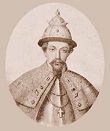
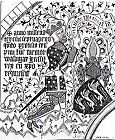
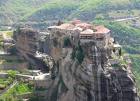
1340 On Mar. 31 grand prince (since 1328) Ivan I (b. 1288) dies, and on Mar. 31 his eldest son Simeon Ivanovich (Gyordi) (the Proud) (1316-53) becomes grand prince of Moscow (until Apr. 27, 1353), claiming the title of prince of all Russia (until 1353), and going on to take on the pesky Lithuanians, using an old treaty with their allies the Mongols to make the Mongol khan give him some Lithuanian POWs to use as hostages. On June 24 after Edward III makes a political alliance with the Flemings, who recognize him as the king of France and overlord of Flanders, causing the French to declare Edward's French fiefs forfeited and siege Guienne and burn Portsmouth (home of the Pomponians), the naval Battle of Sluys (Sluis) (d'Ecluse) on the Scheldt estuary on the coast of Flanders sees Edward III with 150 ships defeat the somewhat larger fleet of Philip VI of France (who made the boo-boo of dismissing two squadrons of mercenary ships from the Levant), and entirely capture or destroy it, gaining complete control of the Channel for England (until 1372), as well as free access to N France; after Edward's army plods around in France awhile without significant success, the countries make a truce; HRE Louis IV and Edward III sign the Alliance of Coblenz,making Edward vicar of the empire and recognizing his title of king of France, turning the Hundred Years' War into a struggle for the English to keep "their" French empire. On Oct. 30 after the Marinids under Abu Hassan defeat the Castilian fleet off Algeciras and land, Alfonso XI of Castile allied with Afonso IV of Portugal defeat the Granadans under Yusuf I and the Marinids at the Battle of Rio Salado in S Spain near Tarifa, becoming the last great Muslim invasion of Spain from Africa. Edward III forces the resignation of his chancellor and former chief advisor Archbishop Stratford, causing the barons to rally to his cause. William O'Kelly (-1375) becomes chieftain of Ui Maine (until 1375) after killing Tadhg Mac Tadhg O'Kelly and Donnough McHugh O'Kelly, whom King Terlagh O'Connor of Connaugh had given the chieftainship to. Waldemar (Valdemar) IV Adderdag (Atterdag) (1320-75), youngest son of Christopher II, who spent most of his childhood and youth in German exile in the court of HRE Louis IV becomes king of Denmark, going on to become one of its top kings, working to break German influence, restrict the power of the nobles and clergy, and reconquer the lands lost by his father. King John I of Bohemia goes blind. Sultan Mohammed Tughluk of Delhi sends emissaries to the caliph in Egypt seeking recognition, which is received in 1344. An Englishman complains that English children "are compelled to leave the use of their own language, a thing which is known in no other country"; after the Black Death kills off French teachers, students begin being taught in their native language of Englsh, causing John of Trevisa to complain that they suffer when they "scholle passe the se and travayle in strange londes." In this decade Florence joins the club, passing anti-homosexual laws. In this decade domestic revolts rock the Tran Dynasty in Vietnam. In this decade in England the knights of the shire and the burgesses begin to separate off into a house of commons, and by this year they meet in the monks' Chapter House in Westminster Abbey. Architecture: About this time Grand Meteoron Monastery in the rocky Meteora ("middle of the sky") wonderland of N Greece on the NW edge of the plain of Thessaly near the Pindus Mts. and Peneios River is built by St. Athanasios of Meteora; five more monasteries later crop up. Births: French nobleman and art patron John of Valois (Berry) (the Magnificent), Duke of Berry and Auvergne, Count of Poitiers and Montpensier (d. 1416) on Nov. 30 in Vincennes; 3rd son of John II and Bonne of Luxembourg; brother of Charles V, Louis I of Anjou, and Philip the Bold (1342-1404). Scottish high chamberlain (1377-82) Sir John Lyon, Thane of Glamis (d. 1382). Azerbaijani Islamic quasi-Sufi Hurifiya (Hurufiyya) mystical numerology sect founder Fadlallah Astarabadi (d. 1394). English nobleman Enguerrand (Ingelram) VII de Coucy, 1st Earl of Bedford (d. 1397); husband (1365-) of Isabella (1332-82), daughter of Edward III. English duke of Lancaster (1361-99), land baron and power broker John of Gaunt (d. 1399) in Ghent; 4th son of Edward III and Philippa of Hainault; brother of Edward, the Black Prince (1330-76); father of Henry Bolingbroke (Henry IV). Scottish regent Robert Stewart, Duke of Albany, Earl of Menteith, Earl of Fife (d. 1420) in Dundonald Castle; son of Robert II (1316-90); father of Murdoch Stewart, duke of Albany (1362-1425); uncle of David Stewart, 1st duke of Rothesay (1378-1402), who with him are the first dukes created in Scotland; husband (1361-) of Margaret Graham, countess of Menteith (1334-80), and (1380-) Muriella Keith; father of John Stewart, 2nd earl of Buchan (1381-1424). Deaths: English poet-chronicler Robert Mannyng (b. 1260). Russian grand duke (1328-40) Ivan I Danilovich Kalita (b. 1288) on Mar. 31 in Moscow.

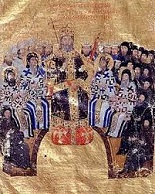
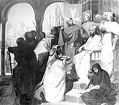


1341 Mars, Jupiter, and Saturn are in conjunction this year, causing French astronomer John (Johannes) (Jehan) de Murs (Muris) (1290-1355) to later tell Pope Clement VI that this is the cause of the Black Plague. On Jan. 14 the Venetian Grand Council finally decides to do something about the Muslim menace in the E Mediterranean, passing taxes to pay for a fleet to defend Crete. On Apr. 30 Breton duke (since 1312) John III the Good (b. 1286) dies childless, starting the War of the Breton Succession (ends 1364) in Brittany, with the French supporting his niece Joanna the Lame of Dreux (Penthievre) (1319-84) and her hubby Charles (the Saint) of Blois (Chatillon) (1319-64), and the English supporting his half-brother (by daddy Arthur II's 2nd wife Yolande de Dreux) John of Montfort (Duke John IV of Brittany) (1295-1345) and his wife Joanna of Flanders (1295-1374). In Apr. Sir William Douglas of Liddesdale (1300-53) recaptures Edinburgh Castle, leaving David II's enemies only Stirling Castle plus some castles on the Scottish-English border, causing David II to return from France, landing on June 2 at Inverbervie on the Kincardineshire coast, spending the next five years trying to consolidate his kingdom and fight uppity nobles. On June 10 an joint church council in Constantinople condemns S Italian humanist theologian Barlaam of Calabria (Seminara) (Bernardo Massari) (1290-1348), a Greek Orthodox champion of Western Aristotelian rationalist ideas and opponent of mystical Hesychasm (meditation, navel-gazing, etc. to partake of God's "energy"), which is popular with the masturbating, er, monks of Mt. Athos; it also condemns theologian (friend of Barlaam) Gregory Akindynos (1300-48), who dies in exile. On June 15 emperor (since 1328) Andronicus III (b. 1297) dies, and his 9-y.-o. son John V Palaeologus (Palaiologos) (1332-91) becomes Byzantine emperor (until Aug. 12, 1376), with his mother Anna of Savoy (1306-65) as regent, and his father's best Gen. John Cantacuzene (Cantacuzenos) (maternal relative of the Palaeologus family) as chancellor, but Anna doesn't trust him, declaring him an enemy of the state, causing him on Oct. 26 to declare himself emperor John VI Cantacuzene (Cantacuzenus) (Cantacuzenos) (1292-1383), and begin the successful 6-year Byzantine Civil War of 1341-47 (Second Palaeologan Civil War) with her, her son, and Patriarch John XIV in Thrace, with Anna allying with the Bulgarians and Cantacuzene with the Serbians and Ottomans, after which in summer 1343 Anna sends an emissary to Pope Clement VI in Avignon to seek help, and in Aug. 1343 he pawns the Byzantine crown jewels to Venice for 30K ducats. Petrarch (1304-74) is crowned poet laureate in the Capitol in Rome; after his father dies, Giovanni Boccaccio leaves his roost in Naples at the court of erudite king Robert the Wise of Anjou, and returns to Florence, where he works as a diplomat and becomes friends with Petrarch; meanwhile Barlaam of Calabria settles in Naples, working for court librarian Paul of Perugia until early 1342 and converting to Roman Catholicism, then moves to Avignon in spring 1342, giving Petrarch lessons in ancient Greek, which are too difficult for him to master, then leaving in late 1342 for a job as bishop of Gerace in Calabria, returning to Avignon for 6 mo. in 1347 to give Petrarch more lessons, which also don't stick. Parliament forces Edward III to restore Archbishop Statford, and passes a statute requiring the king to consult with Parliament before selecting all ministers; within a few mo. he repeals it, but the parity between household officials and courtiers compared to baronial officials is restored; the Statute de Tallagio non Concedendo (Second Statute of 14 Edward III) ("no taxation without representation") requires parliamentary approval for all nonfeudal levies, in accordance with the English medieval principle "to kings belong government, to subjects property", and begins the tradition of Parliament asking for royal redress of grievances by petitioning via billa (bills), which are then turned into statutes after support by the lords and approval by the king. On Aug. 28 Leon IV (b. 1309) is murdered by his barons while holed up in his citadel at Sis hoping for Western aid against the Muslims, and after his younger brother John turns it down, Leon's cousin Guy de Lusignan becomes Constantin (Gosdantin) II of Lesser Armenia (Cicilia) (1344-63), becoming its first Latin king, ending the Hetoumid Dynasty (begun 1226). In late Dec. Gediminas (b. 1275) dies still a pagan, and his middle son Janutis (Jawnuta) ("young man") (1300-1367) becomes grand duke of still-pagan Lithuania (until 1345) after daddy choose the middle of seven sons as a compromise between his other sons, who are pagan and Greek Orthodox? HRE Louis IV the Bavarian comes to terms with Philip VI and deserts Edward III of England after the latter fails to deliver his promised payments and Louis IV wants to try to reach an agreement with Pope Benedict XII over his investiture again. The Portuguese rediscover and claim the Canary Islands, but they are awarded to Castile in 1344 by papal bull. The Queen's College at Oxford U. is founded by Robert de Eglesfield (d'Eglesfield) (1295-1349), chaplain to Edward III's wife Philippa of Hainault; it goes on to build neoclassical campus bldgs. designed by Sir Christopher Wren and Nicholas Hawksmoor. Poetry: Giovanni Boccaccio (1313-75), La Teseide; L'Amorosa Fiammetta (pastoral romance). Xian Zhang, The Iron Cannon Affair; an account of the use of gunpowder cannons in China, which can "pierce the heart or belly when it strikes a man or horse, and can even transfix several persons at once". Births: English lord marshal Henry Percy, 1st Earl of Northumberland, 4th Baron Percy, King of Mann (d. 1408) on Nov. 10 in Alnwick, Northumberland; son of Henry de Percy, 3rd baron Percy and Mary of Lancaster, daughter of Henry, 3rd earl of Lancaster, son of Edmund, earl of Leicester and Lancaster, son of Henry III; father of Harry Hotspur Percy (1364-1403). Norwegian king (1343-80) and Swedish co-king (1362-4) Haakon VI Magnusson (d. 1380); younger son of Magnus Eriksson (1316-74) and Blanche of Namur (1320-63). English duke (founder of the English House of York) Edmund of Langley, 1st Duke of York (d. 1402); 5th son of Edward III (1312-77) and Philippa of Hainault (1311-69). Deaths: Lithuanian grand duke (1316-41) Gediminas (b. 1275) in late Dec. (last week); his pagan burial ceremony features a favorite servant and several German slaves burned on the pyre with his corpse. French duke of Brittany (1312-41) John III the Good (b. 1286) on Apr. 30. Greek Byzantine emperor (1328-41) Andronicus III Palaeologus (b. 1297) on June 15 in Constantinople.







1342 On Apr. 25 Pope (since Dec. 30, 1334) Benedict XII dies in Avignon, leaving 1,117,000 florins for a new Crusade, and on May 7 rich man's son Pierre Roger de Rosiers-d'Egletons (in Correze, Limousin) is elected Pope (#197) (the Black Death Pope) Clement VI (1291-1352) in Avignon (4th Avignon pope), making an avg. income of 118,500 florins a year, soon issuing a bull confirming how-much-this-time Giovanni Visconti as archbishop of Milan, who makes it a 2-for-1 and buys the title of ruler of Milan for 500K florins, sharing it with brother Luchino Visconti (1287-1349); too bad, the new pope squanders his dough on the papal palace in Avignon, the purchase of Avignon from Joanna I of Naples, loans and gifts to the French crown, and luxurious living, with the soundbyte: "My predecessors did not know how to be pope", and "I have lived as a sinner among sinners", but that doesn't stop him from sending a circular letter next Aug. 8 calling for a Crusade, as long as others pay for it, chiding the Hospitalers for their conspicuous luxury, and not too subtly reminding them of the fate of the Templars, and telling everybody to assemble their fleets at Negroponte next Nov. 1 (All Saints Day); another male slut, Plutarch calls Clement VI "an ecclesiastical Dionysius with his obscene and infamous artifices"; after his confessor warns him to give up his dozens of mistresses, Bentadick, er, Clement VI replies that he has been sleeping with whores since his youth and continues on the advice of his physicians? - I reproduce like mice? In June the English fleet relieves the Siege of Hennebont in S Brittany (begun in May) by Charles de Blois-Chatillon, Duke of Brittany (1319-64) (nephew of Philip VI), who is known for placing pebbles in his shoes and wearing knotted ropes next to his skin to mortify his sinful flesh, while inventing the elbow hinge; Joanna of Flanders (1295-1374) is trapped until they liberate the city, causing Charles of Blois to siege Auray; on Sept. 30 William de Bohun, 1st Earl of Northampton (1312-60), constable of England defeats Charles de Blois at the Battle of Morlay; future French superstar Bertrand du Guesclin fights with de Blois' forces and gets some field experience. On July 16 Hungarian king (since 1310) Charles I Robert (b. 1288) dies, and his 16-y.-o. son Louis (Lajos) I (the Great) (1326-82) becomes king of Hungary (until 1382), becoming a patron of learning, with his court at Buda (named after Hun ruler Bleda AKA Buda) - pass the goulash and the porn? Humanism must be around the corner when marriage is separated from the Church by the Ugly Duchess of Wonderland? Mongol Golden Horde khan (since 1313) Uzbeg Khan (b. 1282) dies, and his son Jani Beg (-1357) kills his two brothers and becomes khan of the Golden Horde (until 1357). Fine-looking babe Margarete Maultasch (Bag Mouth) (the Ugly Duchess) of Tirol (1318-69) dumps her first hubby (since 1330) John Henry of Bohemia (1322-75) (brother of HRE Charles IV) for HRE Louis IV the Bavarian's eldest son Louis V the Brandenburger of Bavaria, Margrave of Brandenburg (1315-61), marrying him without being granted a divorce to John Henry first, relying on Louis IV to annul the marriage instead, and his court philosophers William of Ockham and Marsilius of Padua to defend the first "civil marriage" in the Middle Ages, but new pope Clement VI doesn't buy it, and excommunicates them both, causing her to be called ugly and a lot worse by the jealous celibate clergy, while Louis V acquires Tyrol (Tirol) and Carinthia through his new marriage; in 1358 Pope Innocent VI absolves them; too bad, the ecclesiastical propaganda works through the ages, causing her to be portrayed as more and more ugly, until she becomes the subject of the 1816 novel "The Ugly Duchess" by Lion Feuchtwanger, and the Duchess in Lewis Carroll's "Alice's Adventures in Wonderland". After he captures Roxburgh Castle from the English, military hero and royal favorite Sir Alexander Ramsay of Dalhousie (-1342) is murdered by Sir William Douglas of Liddesdale by starvation in the dungeon of Hermitage Castle in order to gain his new offices of royal keeper (constable) of Roxburgh Castle and sheriff of Teviotdale, which pisses-off David II, although he gives him the appointments and later uses it against him; Alexander's brother Sir William Ramsay of Inverleth succeeds him as lord of Dalhousie Castle. Castilian princess Ines de Castro goes to Portugal as lady-in-waiting to the future wife of future king Pedro of Portugal, and he falls in love with her and she becomes his mistress without his daddy knowing. Ibn Battuta leaves Delhi on a mission to China. Pope Clement VI issues the bull Gratiam Agimus, making the Franciscans the official custodians of the Holy Places in the name of the Church; William of Ockham becomes gen. of the Franciscans; the office of Latin patriarch of Jerusalem is established, becoming head of the Order of the Holy Sepulchre (until 1489); in 1374 the office is moved to the Basilica di San Lorenzo Fuori le Mura in Rome. Nonfiction: Levi ben Gerson (Gersonides) (1288-1344), De Sinibus, Chordis et Arcubis (Concerning Sines, Chords and Arcs); treatise on trigonometry. Births: French Valois duke of Burgundy (1363-1404) (founder of the 2nd ducal house of Burgundy) Philip II the Bold (le Hardi) (d. 1404) on Jan. 15 in Pontoise; 4th son of John II the Good (1319-64) and Bona of Bohemia (Bonne of Luxembourg) (1315-49); brother of Jean de France, duc de Berry; father of John the Fearless (1371-1419). Austrian duchess consort Katharine (Catherine) of Bohemia (d. 1395) on Aug. 19; 2nd daughter of HRE Charles IV (1316-78) and 1st wife Blanche of Valois; wife (1350-65) of Duke Rudolf IV of Austria (1339-65), and (1366-) Duke Otto V of Bavaria (1346-79). English Marcher Lord Henry Percy, 1st Earl of Northumberland (d. 1408) on Nov. 10 in Alnwick, Northumberland; son of the 3rd Lord Percy; father of Sir Henry "Hotspur" Percy (1364-1403); the title of Earl of Northumberland comes with the job of Warden of the Marches (Marcher Lord), a powerful position with a private army to defend England against the pesky Scots (no more Sir William Wallaces, please?). Christian mystic Juliana (Julian) of Norwich (d. 1418). Deaths: Italian theologian Michael of Cesena (b. 1270) on Nov. 29 in Munich; expelled from the Franciscan order in 1331; officially rehabilitated in 1359. Hungarian king (1310-42) Charles I (b. 1288) on July 16 in Visegrad. Sicilian king (1337-42) Peter II (b. 1337) on Aug. 8 in Calascibetta

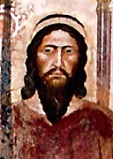

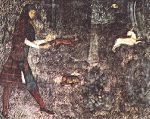
1343 The Venetian Peruzzi and Bardi Family Banks collapse this year and next, destroying the Euro economy; the greedy bankers of Venice, not the Black Death are what ultimately causes the great (35%-50%) pop. decrease in Europe from 1340-1440? On Jan. 19 the Truce of Malestroit, negotiated by cardinals from Avignon is signed by Philip VI and Edward III in Madeleine Chapel in Malestroit in Brittany on the Oust River; it is supposed to last until Sept. 1346. On Jan. 27 Pope Clement VI issues the bull Unigenitus, justifying the power of the pope and the use of indulgences. On Apr. 23 (night) (St. George's Night) St. George's Night Uprising sees the native pop. of Estonia rise against their Danish and German rulers, beginning the Estonian Revolt, one of the biggest working class uprisings of the Middle Ages (ends 1346). On June 22 count (since 1329) Aymon the Peaceful (b. 1291) dies, and his son Amadeus VI the Green Count (1334-83) becomes count of Savoy (until 1383). On July 8 after the Teutonic Order defeats the Poles, the Peace (Treaty) of Kalisz recognizes German claims to Pomerelia, despite papal support of Polish claims, in return for a promise of aid against the pesky pagan Lithuanians; Poland is cut off from the Baltic. On Sept. 3 the U.of Pisa is founded in Pisa, Italy by the bull In Supremae Dignitatis by Pope (1342-52) Clement VI (1291-1352). On Nov. 1 the Crusader fleet run by the Knights of St. John assembles in Negroponte as Pope Clement VI requested, and he manages to scrounge up funds to back them despite the bank collapse; too bad, in Nov. a tsunami cashiers the quays of the once major maritime city of Amalfi on the Gulf of Salerno 20 mi. SE of Naples, whose maritime laws once prevailed throughout Italy, and it goes kaput commercially, not to mention what the plague does to it. Jani Beg leads a massive Crimean Tartar force that attacks the port city of Kaffa (ends Feb. 1344). The Hoysala Empire in S India in modern-day Karnataka (founded 1026) ends, and the Hindu kingdom of Vijayanagara (Karnata) (Bisnegar) (ends 1646) is founded in the Krishna Valley of S Deccan, India, with capital city at Vijayanagara (modern-day Hampi), going on to spread throughout S India and Ceylon. I don't get the joke - it's not a joke it's a product? Edward III's eldest son Edward of Woodstock, later known as Edward the Black Prince (1330-76) is named Prince of Wales, just like he had once been by his daddy Edward II, who had been done ditto by his daddy Edward I; from now on the title indicates the eldest son and heir of the English king. The 52 commununes of Briancon in France receive a charter of liberties. Nonfiction: Jean de Meurs, Quadripartitum Numerorum (Four-fold Division of Numbers); treatise on mathematics, mechanics and music. Art: Sienese painter Matteo Giovanetti paints frescoes for the papal bedroom in Avignon, incl. Man With Ferret. Poetry: Juan Ruiz (1283-1350), El Libro de Buen Amor; satirical autobio. in poetic form; expanded ed. of 1330 version - never too early for Latin lovers? Births: English "The Canterbury Tales" poet-writer-translator-diplomat-courtier (founder of the written English language) Geoffrey Chaucer (Fr. "chausseur" = shoemaker) (d. 1400) in London; son of a London burgher vintner. Deaths: French political theorist Marsilius of Padua (b. 1270). Savoy count (1329-43) Aymon the Peaceful (b. 1291) on June 22 in Montmelian. French king of Navarre (1328-43) Philip III (b. 1306) on Sept. 16. French king of Naples (1309-43) Robert the Wise of Anjou (b. 1277) on Jan. 20.
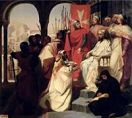
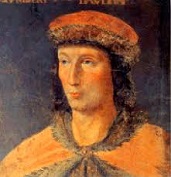

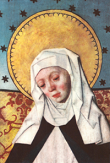
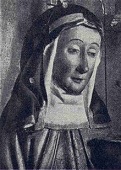
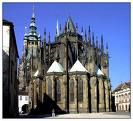
1344 In Feb. the Tartar siege of Kaffa is lifted by an Italian relief force, with 15K Mongols killed; Jani Beg returns next year, but the Black Plague breaks out among his troops, ending the siege. On Apr. 17 Constantin II is murdered in an uprising, and his distant cousin (nephew of Hethum I) Constantin (Gosdantin) III (-1362) usurps the throne, succeeding him as Lusignan king #2 of Lesser Armenia (Cilicia), and ordering his predecessor's nephews murdered, which causes them to flee to Cyprus. On May 13 (Ascension Day) the 24-galley Latin Crusader fleet sinks 52 Turkish ships and burns 60 more, which the Turks abandon at Longus on Pallene in the Chalcidic Peninsula, causing Pope Clement VI to write a letter on Aug. 12 thanking Venetian Doge Andrea Dandolo; meanwhile on Oct. 28 (Feast of St. Jude and St. Simon) the Crusaders surprise-attack and capture the port of Smyrna (Izmir) (until 1402), and drive out pesky Umur Ghazi (the Lion) (Pasha) (1309-48), although they only capture the harbor and waterfront fortress, leaving the Muslims entrenched in hilltop fortifications, with a ghost town in between, beginning the Smyrniote Crusade (ends 1351), led by Roman Catholic patriarch of Constantinople (1339-45) Henry of Asti (-1345). Philip VI invests his son Philip of Valois (1336-76) with the newly-created Dukedom of Orleans (Orléans). Haakon VI Magnusson (1340-80), youngest son of Magnus II (Smek) is elected king of Norway (until 1380), while daddy stays king of Sweden. Alfonso XI of Castile and Leon captures the port city of Algeciras from the Granadan Moors, who use cannon to defend themselves, causing the earls of Derby and Salisbury to take the knowledge back to England, while white Spanish kings begin hiring the nig, er, Moors to teach them about the new hi-tech secret veapons. Amda Seyon I dies, and his eldest son Newaya Krestos ("vessel of Christ") (-1372) becomes Solomonic emperor of Ethiopia (until 1372), going on to promise monastic leader Abuna Yaqob that he will become monogamous, then reneging and marrying three women, exiling him and his monks to Egypt and S Ethiopia. Sultan Mohammed Tughluk of Delhi orders his tax collectors (centurions) executed for failing to meet quotas, causing them to revolt in Gujarat in the S and take it over by next year. The informal Hanseatic League is first mentioned in documents; normally it uses the seal of Lubeck on documents. After getting married at age 14 to Ulf Gudmarson, having eight children, incl. St. Catherine of Sweden, and making a pilgrimage to the St. James of Compostella Shrine in Spain, noble Swedish woman (mgr. of the royal household) (St.) Bridget (Birgitta Birgersdotter)) (1303-73) becomes a nun, and in 1350 she founds the Augustinian nunnery of Vadstena in E Gothland, whose members (nuns and monks) become known as Brigittines (Bridgettines) (Order of St. Saviour), known for promoting lit. culture and translating religious writings; they are approved in 1370 by Pope Urban V; Birgitta's successor is her daughter (St.) Catherine of Vadstena (1332-81). Architecture: St. Vitus' Cathedral in Prague is begun by Matthew (Matthias) of Arras (1290-1352) (finished 1929). Matteo Giovanetti paints frescoes for the banqueting hall of the Chapel of St. Martial in the papal palace of Avignon (1344-5), where papal elections are held. Deaths: French Jewish philosopher Gersonides (b. 1288) in Perpignan; leaves De Numeris Harmonicis (Concerning the Harmony of Numbers), a commentary on the first five books of Euclid. Ethiopian emperor (1314-44) Amda Seyon I. English knight William Montague, 1st earl of Salisbury (b. 1301) on Jan. 30 in Windsor, Berkshire.



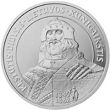


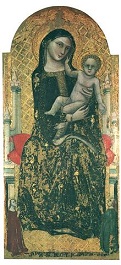
1345 On Jan. 17 (St. Anthony's Day) Umur Pasha's men sneak down and massacre Crusaders holding Mass in an abandoned Christian church in Smyrna, which the Muslims had converted to a stable, killing Venetian cmdr. Pietro Zeno, Henri Asti and the other leaders; the news pisses-off Pope Clement VI, who uses it to drum up more money and men to send to their aid, while trying to keep France and England from messing it up with their war; he recruits Humbert II of Viennois (de la Tour-du-Pin) (1312-55) to be the new leader, with new aid from Venice, and he leaves Marseille in May and arrives in Negroponte around Christmas. In Jan. the French parliament decides in favor of Charles de Blois in the matter of the succession of Limoges. Edward III begins a serious attempt to regain his possessions in S France (Gascony), planning a 3-pronged attack, with the earl of Northampton attacking from Brittany, up-and-coming Henry of Grosmont, 4th Earl of Lancaster (1310-61) (Edward II's 2nd cousin) (son of Henry Plantagenet, 3rd earl of Lancaster, who had gone blind in the 1330s, and who dies on Mar. 25, leaving him the richest man in England as well as the title of earl; he is promoted to duke in 1351) from Aquitaine, and Edward III from Flanders; on Oct. 21 Grosmont achieves a big V against the Comte d'Isle at the Battle of Auberoche, and gets £50K ransom for the POWs; meanwhile rumors that Jacob van Artevelde (b. 1290) is about to recognize Edward III's son as count of Flanders causes a popular uprising in Ghent, and on July 24 he is killed by a mob. After they return from military campaigns in Ruthenia, Jaunutis is deposed by his pagan elder brothers Olgerd (Algirdas) (1296-1377) and Kestutis (1297-1382), and Olgerd (Algirdas) becomes grand duke (until 1377), with Kestutis defending the pesky W border, working together to extend their duchy from the Baltic Sea to the Black Sea, reaching within 50 mi. of Moscow after unsuccessfully sieging it. The kingdoms of Catalonia-Aragon and Rousillon-Mallorca are reunited. The city of Manama (Arab. "place of rest/dreams") in N Bahrain Island on the Persian Gulf (modern-day pop. 157K/411K) is first mentioned. HRE Louis IV confers Hainaut (in NW Germany), Holland, Zeeland, and Friesland on his wife empress (since 1328) Margaret II of Avesnes (Margaret I of Holland) (Margaret II, Countess of Hainaut) (1311-56), causing the Bavarian Wittelsbachs to begin ruling there (until 1432). The Ottomans absorb the Turkoman principality of Karasi, bringing them to the S shores of the Dardanelles, then cross into Europe at the request of John Cantacuzene, helping him take towns along the Black Sea, and form an alliance by giving his daughter Theodora in marriage to Orkhan I; from now on the Ottomans freely cross the Bosporus Straits. The Muslims destroy Jaffa to prevent its possible capture and use by Crusaders, and it takes until the early 18th cent. to be used as a seaport again. Architecture: Notre Dame Cathedral in Paris (begun 1163) is finished. Art: Vitale da Bologna (1289-1369), Madonna dei Denti (Madonna of the Teeth). Nonfiction: Guida da Vigevano (1280-1349), Anatomia Designata per Figures; incl. 24 anatomical plates, becoming the first neuroatonomical descriptions and drawings in scientific history. Births: Korean Goryeo king #34 (last) (1389-92) Gongyang (d. 1394) on Mar. 9. Portuguese king #9 (1367-83) Ferdinand (Fernando) I (the Handsome) (the Inconstant) (d. 1383) on Oct. 31 in Coimbra; eldest son of Pedro I (1320-67) and Constanza Manuel of Castile; gets the nickname Inconstant when he jilts the daughter of the king of Castile for the more desirable Portuguese noblewoman Leonor Teles de Meneses (1350-1405) - after all, he's so handsome he can play The Bachelor? English noblewoman Blanche of Lancaster, Countess of Derby (d. 1369) on Mar. 25; youngest daughter of Henry of Grosmont, 1st duke of Lancaster (1310-61) and Isabel de Beaumont; 1st wife of John of Gaunt (1340-99); mother of Henry IV (1367-1413). Bohemian priest (St.) John of Nepomuk (John Nepomucene) (d. 1393) in Nepomuk; educated at the U. of Prague, and U. of Padua. Scottish explorer Henry Sinclair, Earl of Orkney (d. 1401). Deaths: Italian Roman Catholic priest St. Peregrine Lziosi (b. 1260) on May 1; canonized Dec. 27, 1726 by Pope Benedict XIII; dies with a cancerous sore in one leg, causing him to become the patron saint of people suffering from cancer, AIDS, etc. English knight Sir Geoffrey Luttrell (b. 1276) on May 23 in Lincolnshire; dies after commissioning the illuminated Luttrell (Louterell) Psalter, showing contemporary country life. Italian painter Simone Martini (b. 1284). Flemish leader Jacob van Artevelde (b. 1290) on July 24 in Ghent (killed by a mob). French duke of Brittany (1341-5) John IV of Montfort (b. 1295) on Sept. 16 in Chateau d'Hennebon.

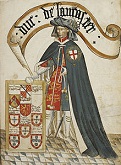
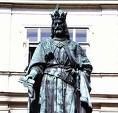
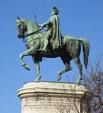
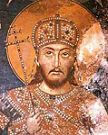
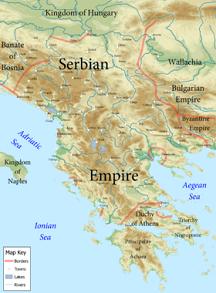
1346 On Mar. 18 the French prepare to defend their English Channel coasts. In spring a severe epidemic of plague begins in the Crimea, depopulating several Mongol towns by Nov., and forcing the Golden Horde to withdraw from the siege of Kaffa (Feodosia) (Theodosia) next year, after which Europeans fighting with the Tartars return to Europe, carrying the plague with them, while others carry the plague to Constantinople and ARabia. On Apr. 1 the French led by Duke John of Normandy begin the Siege of Aiguillon in Gascony, defended by Earl Henry of Grosmont, 4th Earl of Lancaster and Leicester, 1st Earl of Derby (1310-61) (wealthiest and most powerful peer in England), tying up the main French army; on Aug. 20 after a dysentery epidemic in their camp the French withdraw. In May an English invasion fleet begins assembling in Portsmouth. On Apr. 16 Serbian king (since Sept. 8, 1331) Stephen (Stefan) Uros IV Dushan "the Mighty" (1308-55) crowns himself "tsar and autocrat of the Serbs, Greeks, Bulgarians, and Albanians" in Skopje (until Dec. 20, 1355), establishing the Serbian Empire, becoming the first of two Serbian emperors along with his son Stefan Uros V "the Weak"; Serbia is now at its peak, but his son Stephen Uros V loses most of the territory he gains, and the empire breaks up with his 1371 death, although some of his successors in parts of Serbia claim the title of emperor until 1402. In May an English invasion fleet begins assembling in Portsmouth. On June 8 the 26-galley papal fleet of Humbert II of Viennois is attacked by the 29-galley fleet of Genoese adm. Simone Vignosso near Rhodes to prevent them from capturing Chios, which they want for themselves, and which they take after a 3-mo. siege on Sept. 12, after which they occupy Old and New Phocaea on the coast of Anatolia by Sept. 20, restoring Genoese commerce in the Levant; meanwhile Humber's fleet proceeds to Smyrna, arriving in late June; too bad, despite as many as 15K Crusaders massing there, the heat causes them to become ill and die like cattle, and famine sets in, so he ends up leaving and wintering at Rhodes, writing the pope that they should seek a truce, which he agrees to, although Humbert ends up returning home instead when he receives news of his wife's death in 1347; too bad, the Venetians at Smyrna are not ready to give up. On June 9 the Battle of St. Pol de Leon (Léon) sees the 180-man English army under Sir Thomas Dagworth (1276-1350) defeat the 1K-man army of Charles of Blois in Brittany, becoming a turning point for the Montfortists and their English allies in Brittany. On June 20 the Battle of La Roche-Derrien in Brittany is a small English V. On June 24 the leaders of Ghent, Bruges, and Ypres agree to support Edward III in an invasion. On July 3-7 the 1.6K-ship English fleet sails from Portsmouth to Normany, but is forced back by strong winds, after which Edward III orders the closing ports to prevent intel leaks to the French, who are planning their own invasion of England with 14K soldiers under Jean le Franc, but are forced onto the defensive by the English invasion. On July 11 after appointing Queen Philippa as regent of England in his absence, Edward III and his 16-y.-o. son-heir Prince Edward of Woodstock (1330-76) (later the Black Prince) set sail for Normandy with a 15K-man army, arriving on July 12 at Saint-Vaast-la-Hogue 20 mi. from Cherbourg, taking the French by surprise, raiding and burning towns and villages in the Contentin Peninsula incl. Carentan, Saint-Lo, and Torteval until July 18, while the English fleet shadows them, capturing or burning 100+ French ships, and converting 61 into military vessels while looting the countryside for up to 5 mi. inland, causing some ships to fill their holds and return home; the English force incl. at least one Norman baron unhappy with Philip VI's rule. On July 26 the Battle (Siege) of Caen is a V for the 12K-15K-man English army of Edward III over a garrison of 1K-1.5K soldiers and a large number of armed townsmen, who fall in the first assault, losing 5K KIA plus a few nobles taken POW, after which the English sack the town for five days before burning it. On Aug. 1 the English army marches toward the Seine River; on Aug. 2 another small English force invades France from Flanders. On Aug. 24 after the French garrison all the bridges and fords over the Somme River and chase the English army, who find the land stripped of food supplies, trapping them, the Battle of Blanchetaque 10 mi. from the English Channel and just S of Crecy sees a French force under Godemar I du Fay (-1350) attempt to prevent the English from fording the Somme River, ending up fleeing, allowing the English to head N. On Aug. 26 after following the Seine River to within 20 mi. Paris, then heading for Flanders, ending up intercepted and trapped at the Somme, discovering a ford just in time and digging-in on some hills near Crecy (where the horsemen dismount), the Battle of Crecy (Crécy) S of Calais and NW of Amiens is a V for Edward III's 10K-man force (which is 0-1 after Sluys) over Philip VI and his 20K undisciplined cavalry and mercenary crossbowmen; blind King John of Bohemia (b. 1296) is KIA; Prince Edward, in command of the right wing of the English army wins his spurs; gunpowder artillery is used for the first time in Europe?; the first time that the English longbow (made possible by the amazing elasticity of yew wood) triumphs over the (Genoese) crossbow, marking the first joint participation of yeomen and aristocrats in war, made possible by their experiences in Wales and Scotland; as a consequence of this battle, knights begin to put heavy plates over their chain mail, and by the end of the cent. they wear complete armor-plated suits - are you crecy? On Aug. 26 blind Bohemian king John of Luxembourg (b. 1296) is KIA at the Battle of Crecy, and his eldest son Count Charles IV of Luxembourg (1316-78) becomes duke of Luxembourg and king of Bohemia (until Nov. 29, 1378); meanwhile with the help of Pope Clement VI he is elected on July 11 as antiking of the Romans to HRE Louis IV, who is deposed, then crowned on July 25; Edward the Black Prince honors John of Luxembourg by adopting his arms and motto "Ich Dien" (I Serve); meanwhile when the citizens of the Alsatian city of Hagenau (16 mi. N of Strasbourg) (S of the Forest of Hagenau, largest undivided forest in France) refuse to submit to him and pay war debts, Johann (John) II of Lichtenberg (1273-1366) confiscates the houses and synagogues of the wealthy Jews, causing the pop. to plunder them also and then banish them, but they are soon readmitted after agreeing to pay the city's war debts, after which by the end of the decade Jewish persecutions in France cause many Jews to flee there - making it the Palm Springs of Europe? That holy oil must have been defective? On Sept. 4 Edward III sieges Calais, while Duke Henry of Grosmont captures Poitiers; meanwhile in Oct. at the request of Philip VI, David II of Scotland and his barons invade N England with 12K men, and after a leisurely progress to show how boss they are, they are surprised and defeated on Oct. 17 by 8K English under Ralph de Neville, 2nd Baron Neville de Raby (1291-1367) and the Aachbishop of York in the Battle of Neville's Cross; Robert Stewart, Earl Patrick Dunbar of March, and the earl of Ross desert after the first two Scottish divs. are attacked, becoming the only time that Robert Stewart crosses the border into England; 63-y.-o. old fart Edward de Balliol leads 80 men into battle for the English, his kingship claim a joke by now?; David II is wounded in the head by arrows twice, then captured by John de Coupland, Lord of Raby, and almost all of his key supporters are captured or KIA, incl. Sir John Sinclair of Herdmanston, and Sir William Douglas of Liddesdale, who is released after swearing allegiance to Edward III; David is kept prisoner in the Tower of London (until 1357); the holy black snake charm, er, Holy Black Rood (brought to Scotland by Queen Margaret in 1070) is captured by the English and kept at Durham Cathedral until the 16th cent.; for the next two cents. the English have to guard against Scottish invasion whenever they battle France. On Sept. 12-Oct. 31 after the French siege of Aiguillon is lifted, Earl Henry of Lancaster's Chevauchee (Chevauchée) (Fr. "horse charge") overruns large parts of SW France incl. Quercy, Bazadais, Poitiers (Oct. 4), Saintonge, Aunis, and Poitou, penetrated 50 mi. beyond the borders of Gascony. On Sept. 24 the English siege Calais. On Oct. 17 after the French call on the Scots to fulfill their obligations under the Auld Alliance and invade England, the Battle of Neville's Cross W of Durham, England is a V for 6K-7K English under Ralph Neville, 2nd Baron Neville of Raby (1291-1367) over 12K pesky Scots under David II, who make their last stand on a hill under an Anglo-Saxon stone cross, after which Neville pays for a new cross to celebrate; most of the Scottish leaders are KIA or captured; David II is made a POW; the V frees the English to concentrate on France; while he is being held for ransom, David II of Scotland asks the Scottish parliament to recognize his infant nephew John de Moravia, Master of Sutherland (1346-61), son of William de Moravia, 5th Earl of Sutherland as his heir presumptive ahead of his older nephew Robert Stewart. On Nov. 1 the Teutonic Knights invade Estonia, ending the Estonian Revolt (begun 1343); Denmark sells N (Danish) Estonia to the Teutonic Knights for 19K marks, after which the king asks the pope for forgiveness for breaking Christopher II's 1329 promise to never do it. Valdemar IV Adderdag of Denmark regains Zeeland, and sells what's left of Estonia to the Teutonic Order. The Tatars catapult plague-infected corpses into an Italian trade settlement in the Crimea. The city of Parma falls under the control of Milan. The estates of , led by provost of the merchants Etienne Marcel (102-358), richest man in Paris refuses war levies by the French crown, and demands reforms, which the king lamely attempts? Births: French poet Eustache Deschamps (AKA Morel) (d. 1405) in Vertus, Champagne. Deaths: Bohemian king (1311-46) John of Luxembourg (b. 1296) on Aug. 26 in Crecy, France (KIA).



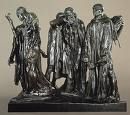
1347 On Feb. 3 Hesychast book lover and able gen. John VI Cantacuzene reenters Constantinople as emperor, appointing anti-Hesychast scholar Demetrius Cydones (Cydonius) (Demetrios Kydones) (1324-98) as his chancellor, and deciding to try to reconcile the Greek and Latin churches, preparing a golden bull signed in cinnabar ink "giving our lord the pope his proper title and recognizing the primacy and universality of the Roman Church", and requesting a joint synod in Constantinople, Negroponte, or Rhodes to discuss union, also promising to personally lead a rescue army to Smyrna; John VI Cantacuzene is accepted by John V Palaeologus as senior co-emperor (until 1355); too bad, to win he allies himself with the Ottoman Turks, becoming the dork who is responsible for giving them a foothold in Europe, making an Ottoman V over Constantinople unstoppable even if they could have obtained Western military aid. In Apr.-Dec. Tribune of the People Cola di Rienze rules Rome. In the spring the Latin Crusaders finally score a V and capture 118 Turkish ships at Imbros (Imroz) Island (modern-day Gokceada). On July 1 Albert (Albrecht) II (the Fox) (the Vulture) of Mecklenburg (1318-79), husband of Eric of Sweden's daughter Euphemia (whose mother is Haakon V of Norway's daughter Ingeborg) becomes the first duke of Mecklenburg on the shore of the Baltic Sea in N Germany based in Schwerin, and plots to put his 2nd son Eric on the Swedish throne; the House of Mecklenburg goes on to rule until 1918. In Aug. starved Calais capitulates to the English after an 11 mo. siege in which artillery is used, and after English queen Philippa of Hainault intervenes and persuades her hubby to spare them for the mojo of her unborn child, Edward III offers to spare the people of the city if six of its leaders will walk out naked (shirt only?) wearing nooses around their necks while carrying the keys to the city and castle, causing Eustache de Saint Pierre and five other burghers to comply; in 1884 the mayor of Calais commissions Auguste Rodin to make the statue The Burghers of Calais (Les Bourgeois de Calais) commemorating this event (finished in 1889), but he shows them clothed; military turkey Philip 666, er, VI (0-3 after Sluys, Crecy, and Calais) signs a truce designed to last until Apr. 1351, with the English giving back their original motherland of Normandy (until 1415), but holding onto Calais of the former county of Artois for the next two cents. (until 1558), controlling both sides of the Channel at its narrowest part; the English Vs in Gascony are secured until 1355; Prince Edward sets his sights on Bordeaux; Edward III goes on to build the Hotel de Guise in Calais; meanwhile Philip VI is flat broke, and debases the coinage, borrows heavily, levies more extreme taxes, incl. the hated gabelle (salt tax), and just when it looks like it can't get any worse, guess what, here comes the Purple People Eater? On Oct. 11 HRE (since 1328) Louis IV the Bavarian (b. 1282) dies during a bear hunt, and on June 17, 1349 Charles IV of Luxembourg (1316-78) is unanimously elected king of the Romans (until Nov. 29, 1378), and crowned on Nov. 26, 1349 in Bonn. The Black Death (the original Darth Vader) rockets through Europe's Internet with breathtaking speed? In Oct. a Genoese trading fleet arrives in Messina, Sicily carrying the Black Death (Bubonic Plague), caused by Yersinia pestis bacteria carried by fleas from rats; really viral hemorrhagic fever from Ethiopia?; not rats but gerbils?; it also arrives in Egypt, Syria, and Cyprus; by 1351 it kills 20M-30M in Europe (a third of Europe's pop., and up to 60% in some areas), and 75M worldwide by 1361; world. pop. decreases from 450M to 350M-375M by 1400; Europe takes 150 years to return to 1347 pop. levels; it ravages China, halving its pop. from 123M in 1200 to 65M in 1400; lucky America is not affected, but not toughened up by it either?; rats didn't really spread it, because it spreads so fast from person to person?; French Franciscan Order minister-gen. (since 1329) Gerard Odon (Geraldus or Gerardus Odonis) (Guiral Ot) (1285-1349) is asked by the pop. of Messina to retrieve the relics of St. Agatha from Catania, and when they refuse he dips them in holy water and takes instead, dying of the plague on his return trip. Louis I of Hungary campaigns in Italy to avenge the murder of his brother Andrew and solidify the position of his house in Naples. A revolt against Sultan Mohammed Tughluk of Deli in Gulbarga, Daulatabad, Berar and Bidar in the Muslim areas of the Deccan elects Bahman Shah (-1348) as the Muslim first ruler of the Bahmani Sultanate (ends 1527), with capital at Gulbarga (Kalaburagi), which eventually begins building fortresses using Euro scientists. Robert Stewart becomes king's lt. again (until 1357), trying to keep David II from being released so he can increase his landed interests, becoming a thorn in David's side since he has no son to take his place as heir presumptive; meanwhile Robert has to formally marry his 1st wife Elizabeth Mure (Muir) (-1355) of Rowallan to legitimize his four sons, incl. future Robert III (b. 1337). Births: Italian lord of Ferrara and Modena (1388-93) Alberto d'Este, Marquis of Ferrara (d. 1393) on Feb. 27; son of Obizzo III d'Este (1294-1352); brother of Niccolo II d'Este (1338-88); father of Nicollo III d'Este (1383-1441). Italian Dominican nun (patron saint) (St.) Catherine of Siena (d. 1380) on Apr. 30 in Siena; daughter of a dyer; canonized in 1461; feast day: Apr. 30. Sardinian judge (1383-1404) Eleanor de Bas-Serra (Arborea) (Arbaree) (d. 1404) in Molins de Rei; daughter of Marianus IV of Arborea and Timbora de Rocaberti. Deaths: English scholar ("the invincible doctor") William of Ockham (b. 1280) on Apr. 10 - let it grow? German HRE (1328-47) Louis IV the Bavarian (b. 1282) on Oct. 11 near Furstenfeldbruck in Puch; dies during a bear hunt; buried in the Frauenkirche in Munich.

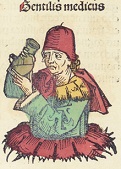

1348 In Jan. the Black Death begins in Marseille and Languedoc, spreading to Avignon in Mar., and Siena, Toulouse, Narbonne, Montpellier, and Carcassone in May; after the cemeteries are filled, bodies are piled high on the Campus Floris near the Church of St. Mary of the Miracles; in June it spreads to Spain, and Bordeaux, Lyon, Burgundy, Normandy, Paris, and SW England in Aug., along with Howth and Drogheda in Ireland; Agnolo di Tura the Fat of Siena, Italy writes the soundbyte: "The mortality in Siena began in May. It was a cruel and horrible thing. The victims died almost immediately. They died by the hundreds, both day and night. I buried my five children with my own hands, and so did many others likewise. Nobody weeps no matter what his loss because almost everyone expected death. So many died that all believed it was the end of the world"; it then disappears for the winter, except Ireland, which it decimates; the Great Plague results in horrible Jewish pogroms throughout Europe, incl. Chillon, Basle, Stuggart, Ulm, Speyer, Dresden, Strasbourg, and Mainz, destroying 60 major and 150 minor Jewish communities, causing survivors to head for Poland, which welcomes them as Kasimir III reworks the Polish law codes; in Strasbourg 2K Jews are hanged; in Freiburg ? are burned alive in wooden bldgs.; Basle burns 600 Jews, expels the rest, and destroys their synagogue and cemetery; Alfonso XI of Spain proposes that the Jews give up banking and take up agriculture; meanwhile, Millennium Fever is on full blast, and when terrible earthquakes rock Italy, this combined with the plague convince people that the end of the world is nigh. In Jan. a Turkish proposal for peace in Smyrna from Umur Pasha reaches Avignon, but Pope Clement VI, who knows the Crusaders are exhausted and want to leave gets hung up on a demand that the new Christian fortress be destroyed, calling it an offense to Christendom; meanwhile on Mar. 5 a letter from Byzantine emperor John VI Cantacuzene arrives, promising 15K-20K men for a renewed attack, to be led by him personally, along with a request for a synod to discuss church union; too bad, in Jan. the plague arrives, throwing him off-balance, and he takes until 1350 to answer the emperor, while Umur Pasha takes the request to keep the fortress intact as proof that they want to stage future attacks in his territory, causing him to try to destroy it in a surprise attack in May, which backfires, and he is KIA by an arrow, securing the Latin control of who-cares Smyrna; meanwhile the emperor gets diverted by an expedition against Stephen Dushan, then after learning of his friend Umur's death, calls off the attack; Umur Pasha is succeeded by his elder brother Khidr Beg (Ihalabi), ruler of Ephesus, who on Aug. 18 arranges a truce with the Hospitalers and sends negotiators to Avignon to make peace. On Apr. 7 Bohemian king Charles IV of Luxembourg (1316-78) makes official the work of his father John of Luxembourg, founder of the Luxemburg dynasty in Bohemia, officially creating the Crownlands of Bohemia, consisting of the original kingdom of Bohemia plus adjoining lands (Moravia, Silesia, Upper and Lower Lusatia); on Apr. 7 he issues a Golden Bull founding the U. of Prague (Charles U.), the first univ. in C Europe, making it a thrilling intellectual center and turning Prague into a chief city of pockmarked Europe. On Sept. 26 Pope Clement VI issues the bull Quamvis Perfidiam, attempting to dispel the rumor that Jews caused the Black Death by poisoning wells, saying that they too are suffering from the plague, but he is ignored. The False Waldemar (Valdemar) becomes ruler of Brandenburg (until 1350). Denmark regains most of Jutland and Fünen (Funen). Burmese king (since 1331) Binnya E Law (b. 1308) dies, and his nephew Binnya U (1323-84) becomes Hanthawaddy king #8 of Burma (until 1384), becoming known for owning a white elephant and repairing he Shwedagon Pagoda in 1362. Avignon in SE France is sold by Joanna I of Naples to Pope Clement VI - you pay for the gravediggers? Gonville and Caius College at Cambridge U. is founded by Edmund Gonville (-1351), rector of Terrington St. Clement in Norfolk; after he dies leaving it broke, his executor Bishop William Bateman of Norwich transfers it to Trinity Hall, and renames it Hall of the Annunciation of the Blessed Mary; it is refounded in 1557 by physician John Kays (1510-73), who changes his name to the Greek spelling Caius. Architecture: The Gothic Cathedral of Asti in Asti, Italy (in the Piedmont) (ancient Asta Pompeia) is finished. Art: Nino Pisano (1315-67), Madonna and Child (sculpture). Novels: Giovanni Boccaccio (1313-75), The Decameron (1348-53); about a party of wealthy ("well-bred, of worth and discretion") young patricians (seven women, three men) who take refuge from the Great Plague in a villa outside Florence with great gardens, and tell each other bawdy stories for 10 nights (100 in all), which becomes a storehouse for later writers to loot, incl. Chaucer and Shakespeare, and are later endlessly recycled by romance novelists and TV soap operas; the stories "Putting the Tail on the Donkey" and "Putting the Devil in Hell" are keepers, as are stories about what a wise and cool guy Saladin was; the Story of Jeannot de Chauvigny and His Jewish Friend sees a Jew visit Rome to see if Christianity is the true religion by observing the papacy, and after he finds them having swinging bi sex he decides it is and converts; "It seems to me that your Lord and his acolytes put all their energy into destroying Christianity and banishing it from the Earth. But I observe that your religion grows apace and gains in lustre and magnificence. I think that this can only be the work of the Holy Spirit, and that therefore it must be the one true religion." Births: English royal mistress (of Edward III) Alice Perrers (d. 1400) in Hertfordshire. Deaths: Italian jurist Giovanni d'Andrea (b. 1270). Italian painter Bernardo Daddi (b. 1280). Italian painter Pietro Lorenzetti (b. 1280). Spanish poet Juan Manuel (b. 1282). Italian Roman Catholic bishop-philosopher Barlaam of Calabria (b. 1290); Greek-to-Roman-Catholic convert Simon Atumano succeeds him as bishop of Gerace. Italian painter Ambrogio Lorenzetti (b. 1290); leaves the fresco The Effects of Good Government in the City and in the Country in the Palazzo Pubblico in Siena. Italian sculptor Andrea Pisano (b. 1290) in Orvieto. Greek theologian Gregory Akindynos (b. 1300) (plague); dies in exile after being excommunicated in 1347 by the Council of Constantinople. Burmese king (1330-48) Binnya E Law (b. 1308) in Pegu. Italian physician (pioneer in cardionephrology) Gentile da Foligno (b. ?) on June 18; known for applying the "art of latitudes" to Galen's physiology; leaves Consilia.




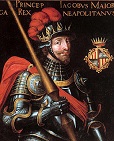
1349 Plague kills one-third of the pop. of Syria and Egypt, wiping out the Mamluk households holding the Mamluk Empire together; the Muslims handle the religious problem of how and why when they pray 5x a day and are the true followers of the True Prophet (praised be his name, and no paparazzis please) yet get the plague like other infidels by adopting the attitude of pious resignation to the will of Allah (Inshallah = "it's Allah's will"), causing them to go on with everyday activities like nothing unusual is happening, ruling out quarantines and other impious disrupting efforts. On Jan. 9 the Jewish pop. of Basel, Switzerland is burned for causing the Black Death, followed on Feb. 14 by 2K more Jews in Strasbourg. Love the snakeskin you're in? In Jan. after finding his wife Isabella Fieschi (niece of Pope Adrian V) cheating on him and promising a terrible punishment, Luchino Visconti (b. 1287) is poisoned by her, causing her to gain the nickname "Isabella del Veleno" (Isabella of Poison); his exiled (since 1346) nephews (sons of brother Stefano Visconti) Matteo II Visconti (1319-55), Bernabo (Bernabò) (Barnabò) Visconti (1323-85), and Galeazzo II Visconti (1320-78) return and claim a share of rule with Giovanni Visconti, ousting Luchino Novello (Jr.) from the succession because of Isabella's infidelities. In the spring the French unsuccessfully attempt to recapture Calais. On Apr. 3 Eudes IV (b. 1295) dies without heir, and his 3-y.-o. grandson Philip I (1346-1361) succeeds as duke of Burgundy (until NOv. 21, 1361). On May 31 (Pentecost) the death rate from plague eases in London after 60% of the pop. is killed since last fall; it was really spread via coughing? In the summer the Great Plague reappears in Paris, where it peaks, killing up to 800 a day, and spreads to Picardy, Flanders, and the Low Countries; also in the summer it reappears in London, and spreads to Ireland, killing 25% of the pop. within a year; by the middle of the year half of the pop. of Venice is killed; by the end of the year half of England's pop. is killed, and a truce with France is called; the plague spreads to Norway when an English ship full of corpses floats into Bergen, and reaches Elbing (Elblag), Poland on Aug. 24; the Church and its credibility being challenged head-on, the main solution offered is by the Flagellants, who appear in force all over Europe (especially Germany), torturing themselves publicly, and proclaiming that the Second Coming is 33.5 years away (I been a bad, bad boy, so tan my sinful hide?), while causing trouble for Jews, the rich, the Church, and finally themselves (besides all the wounds), causing Pope Clement VI to pub. a bull condemning them on Oct. 20; "Many persons, and even young children were soon bidding farewell to the world, some with prayers, others with praises on their lips." In June after they are blamed for the Black Plague, HRE Charles IV removes imperial protection from the Jews of Frankfurt, transferring the special Jewish tax to the Frankfurt town council for 15.2K pounds; too bad, he declares that the town can't be held responsible for Jewish pogroms, and that the dead Jews' possessions revert to the city, and on July 24 all 60 Jews in Frankfurt are killed by orders of the city council, who blame it on Flagellants; the plague reaches Frankfurt in the fall; meanwhile the city declares for Charles IV's rival Gunther von Schwarzburg, and braces for an attack. On Oct. 25 the Battle of Llucmajor in Majorca sees Peter IV of Aragon defeat and kill his rash cousin James III the Rash (b. 1315), ending the independence of the Balearic Islands along with the Kingdom of Majorca (founded in 1276); his son James (Jaume) IV of Majorca (1336-75) is taken POW by Peter IV, and imprisoned in Barcelona in an iron cage (until 1362). Bogdan Voda, voivode ("army leader) of a group of Vlachs (Wallachians) drives the Tartar and other tribes from the area between the Carpathian Mts. (on the W) and the Prut River (on the E), founding the principality of Moldavia; during the succeeding decades it extends its borders to the Dniester River, while fellow Vlachian principality Wallachia extends to the lower Danube River. Count Humbert II, the last dauphin (Fr. "dolphin") of Vienne in SE France sells the (bottlenose?) region of Dauphine (Dauphiné) (English Dauphiny) (originally the County of Albon) in the old kingdom of Arles or Burgundy to Charles Valois (who becomes Charles V in 1364), and thereafter the eldest son (heir apparent) of the French king is called the dauphin (until 1830), with him becoming the first, which makes sense since the title of king of Arles was a favorite of Frederick I Barbarossa and other German HREs, and the title of prince of Wales has been used by the English since Edward II. Stephen Dushan draws up a Serbian Law Code. The House of Wittelsbach in Bavaria is whittled into Landshut, Straubing, Ingolstadt, and Munich branches, which are not whittled back until 1505. The Chinese finally settle Singapore in Malaysia. After the plague causes labor shortages, putting pressure on wages, Edward III of England issues an ordinance that "Every man and woman of our realm of England, of what condition he be, free or bond, able in body” must accept work for the first employer attempting to hire them, and at the old wages, under penalty of prison; ditto for those giving alms; too bad, the ordinance is full of holes, causing the 1351 Statute of Labourers to be enacted. Architecture: Monte Cassino Abbey in Italy is damaged by an earthquake, and is rebuilt, but begins a long decline. Nonfiction: Konrad von Megenburg (1309-74), Buch der Natur; claims that earthquakes are caused by winds accumulating inside the Earth. Jean de Roquetaillade (-1366), Visions of Revelation. Births: Austrian Hapsburg duke (1365-95) Albert III "the Pigtail" (d. 1395) on Sept. 9 in Vienna; 3rd son of Albert II (1298-1358). Deaths: Italian physician-inventor Guido da Vigevano (b. 1280). French Franciscan Order minister gen. (1329-49) Geraldus Odonis (b. 1285) in Catania, Sicily (plague). English chaplain Robert de Eglesfield (b. 1295) on May 31. French countess Jeanne III of Burgundy (b. 1308).